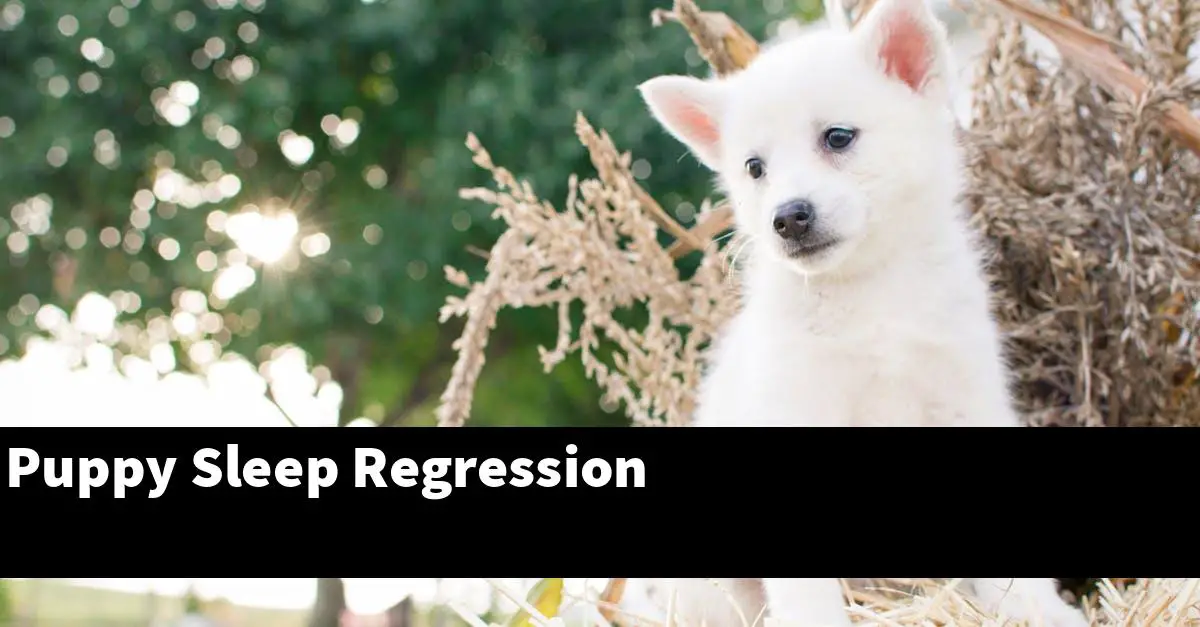A puppy sleep regression is a normal part of a puppy’s development when they suddenly start waking up more often during the night. This can happen at around 4-5 months old and usually lasts for a few weeks. During this time, puppies may need more attention and supervision, and may need to sleep in a crate or pen to prevent them from getting into trouble.
The article will be discussing what a puppy sleep regression is, why it happens, and how to deal with it.
Table of Contents
How do I know if my puppy is experiencing sleep regression?
One of the most common questions new puppy owners have is whether or not their pup is experiencing sleep regression. Sleep regression is a normal part of puppy development, and usually occurs around the same time as other milestone events like teething or fear periods.
There are a few telltale signs that your puppy is experiencing sleep regression. First, you may notice that your puppy is sleeping less during the day and seems more restless at night. He may also start to whine or cry when left alone, or may have accidents in the house even if he is house-trained.
If you notice any of these signs, don’t panic. Sleep regression is a normal part of puppyhood and will eventually pass. In the meantime, try to stick to a regular routine for your puppy and make sure he has plenty of opportunity to exercise during the day. This will help him to tire himself out and make it easier for him to sleep at night.
What are some possible causes of sleep regression in puppies?
There are a few possible causes of sleep regression in puppies. One cause could be that the puppy is not used to sleeping through the night and needs to adjust to a new sleep schedule. Another possibility is that the puppy is experiencing some sort of stress or anxiety that is keeping them from sleeping through the night. If the puppy is not used to sleeping in a crate, this could also be a cause of sleep regression. Lastly, teething can sometimes cause sleep regression in puppies as they may be in pain or discomfort.
How can I help my puppy through a sleep regression?
Assuming you are referring to a sleep regression in puppies that is caused by teething, there are a few things you can do to help your puppy through this tough time. First, make sure your puppy has plenty of chew toys available to help soothe their gums. You can also give them a frozen washcloth to chew on for a bit of relief. Secondly, try to stick to a regular sleep schedule as much as possible. This will help your puppy (and you!) to get the most rest possible. Finally, be patient and understanding- your puppy is going through a tough time and will get through it with a little help from you!
Will sleep regression always happen at the same age for puppies?
At around 8 to 10 weeks old, puppies begin to experience their first real “sleep regression.” Up until this point, puppies sleep a lot— usually around 18 hours a day. But as they hit this age, they start to wake up more often and have a harder time falling and staying asleep.
There are a few possible explanations for why this happens. For one, puppies are starting to become more aware of their surroundings at this age. They’re also going through a lot of growth and development, which can disrupt their sleep patterns.
Sleep regressions usually last for a few weeks before your puppy’s sleep patterns start to normalize again. However, it’s not uncommon for puppies to experience occasional wakefulness throughout their first year of life.
Why is my puppy suddenly not sleeping through the night?
If your puppy was previously sleeping through the night and has suddenly started waking up, there are a few possible explanations. One possibility is that your puppy is experiencing some sort of stress or anxiety. This could be due to a change in routine (such as a new pet or baby in the home), a move to a new house or apartment, or even just the start of puppyhood (when they are learning to be away from their mother and littermates). If your puppy is exhibiting other signs of stress or anxiety (such as panting, shaking, whimpering, or pacing), this is likely the cause of their nighttime waking.
Another possibility is that your puppy is not getting enough exercise during the day. A tired puppy is a sleepy puppy, so make sure they are getting plenty of playtime and walks. If they are still full of energy at night, you may need to increase their exercise.
Finally, some puppies simply wake up because they need to go to the bathroom. If your puppy is not house-trained yet, they may need to go out several times during the night. If they are house-trained but have started having accidents in the house, this could be a sign of a medical problem such as a urinary tract infection or diabetes. If your puppy is waking up to go to the bathroom multiple times a night or is having accidents in the house, please consult your veterinarian.
Can puppies sleep regression?
Many new puppy owners are surprised when their previously well-sleeping puppy starts waking up in the middle of the night and demanding attention. This is often referred to as a “sleep regression” and is a normal, albeit frustrating, part of puppyhood.
There are a few things that can contribute to a sleep regression in puppies. One is simply that they are growing and need more calories, so they may wake up more often to eat. Another is that they may be going through a fear period, which can cause them to be more anxious at night and have trouble sleeping.
The good news is that sleep regressions are usually temporary and will resolve on their own as your puppy grows and matures. In the meantime, there are a few things you can do to help your puppy (and yourself) get through it. Make sure you are feeding your puppy enough during the day so they are not waking up hungry. You can also try to create a calm and quiet environment at night, with minimal stimulation. If your puppy is still having trouble sleeping, you may need to consult with a veterinarian or animal behaviorist for more help.
Do puppies regress at 6 months?
Puppies generally reach full size by six months of age. However, some may experience a growth spurt during this time and continue to fill out until they are a year old. During this time, puppies may “regress” in their behavior, appearing more like a puppy than they did just a few months ago. This is normal and not cause for concern. Puppies may become more playful and excitable, mouth more, and chew on objects more than they did previously. This is simply due to their age and is not indicative of any problems.
Why has my puppy started crying at night again?
If your puppy has started crying at night again, there are a few possible explanations. It could be that your puppy is feeling anxious or stressed, and is crying as a way to self-soothe. It could also be that your puppy is experiencing some sort of pain or discomfort, and is crying out in distress. If your puppy has started crying at night, it’s important to take him to the vet to rule out any medical causes. Once any medical causes have been ruled out, you can work on addressing the underlying behavioral issue. If your puppy is anxious or stressed, you can work on building his confidence and teaching him some relaxation techniques. If your puppy is in pain, you can work on finding the source of the pain and addressing it.
Summary
– Sleep regression is a normal part of puppy development. It usually occurs around 4-5 months old and lasts for a few weeks. Puppies may need more attention and supervision during this time, and may need to sleep in a crate or pen to prevent them from getting into trouble.


